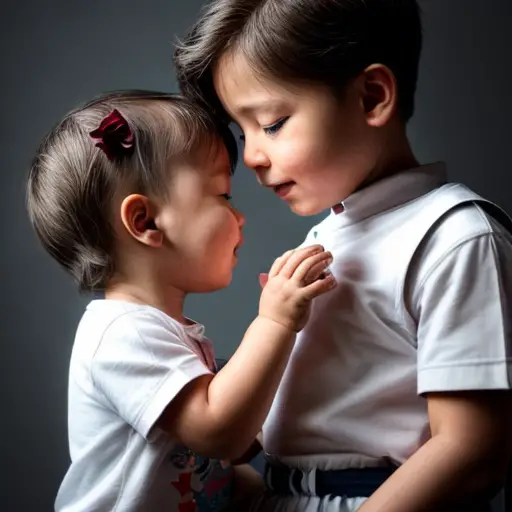The Impact of Sibling Relationships on Child Development: An Overview
Sibling relationships have the power to shape a child's development in ways that even the most advanced parenting books can't fully capture. From the moment they enter the world, siblings become the ultimate partners-in-crime, teaching each other valuable life skills like negotiation (aka, who gets the last cookie), conflict resolution (aka, who broke mom's favorite vase), and the art of sharing (aka, who gets to hog the TV remote). These relationships are like a never-ending rollercoaster ride, filled with moments of love, rivalry, and the occasional wrestling match over who gets to sit in the front seat of the car. So, whether they're teaming up to create chaos or forming an unbreakable bond, siblings have a profound impact on a child's development, shaping them into the resilient, adaptable, and occasionally mischievous individuals they become.
Sibling Rivalry and its Effects on Emotional and Social Development
One interesting fact about how siblings affect child development is that having siblings can enhance a child's social skills and emotional intelligence. Research has shown that growing up with siblings provides children with opportunities to learn important social and emotional skills such as sharing, cooperation, negotiation, and conflict resolution. Siblings serve as built-in playmates, allowing children to engage in pretend play, problem-solving, and communication, which are crucial for their cognitive and emotional development. Additionally, having siblings can also help children develop empathy and understanding as they learn to navigate different personalities, perspectives, and needs within the family dynamic.
Sibling rivalry, the age-old battle for parental attention and the coveted title of 'favorite child,' has long been a staple of family dynamics. While it may seem like a never-ending source of frustration for parents, this rivalry actually plays a crucial role in a child's emotional and social development. Siblings constantly push each other's buttons, testing boundaries and learning how to navigate complex emotions like jealousy, anger, and empathy. Through these heated exchanges, children develop crucial social skills such as negotiation, compromise, and conflict resolution. So, while it may be exhausting for parents to referee these sibling squabbles, they can take solace in knowing that this rivalry is ultimately shaping their children into emotionally resilient and socially adept individuals.
The Role of Siblings in Cognitive and Language Development

Siblings play a significant role in a child's cognitive and language development, serving as built-in playmates, teachers, and sounding boards. Through play, siblings engage in imaginative scenarios, problem-solving activities, and role-playing, all of which stimulate cognitive growth. They challenge each other's thinking, encouraging creativity and expanding their cognitive abilities. Additionally, siblings often engage in joint attention, where they focus on the same object or activity, fostering shared experiences that enhance language development. They engage in conversations, storytelling, and even invent their own secret languages, providing ample opportunities for language acquisition and communication skills.
Furthermore, older siblings often take on the role of a mentor or tutor, helping their younger siblings learn new concepts and skills. This dynamic creates a unique learning environment where the older sibling can reinforce their own knowledge while simultaneously supporting the younger sibling's cognitive development. This teaching relationship fosters a sense of responsibility and empathy in the older sibling, while the younger sibling benefits from personalized instruction and guidance.
However, it's important to note that the impact of siblings on cognitive and language development can vary depending on factors such as birth order, age gap, and individual personalities. For instance, research suggests that first-born children tend to have higher cognitive abilities due to their exposure to more advanced language and cognitive stimulation from their parents and older siblings. On the other hand, younger siblings may benefit from having older siblings as role models, accelerating their cognitive and language development.
In conclusion, siblings have a profound influence on a child's cognitive and language development. Through play, joint attention, and teaching roles, siblings provide valuable opportunities for cognitive growth, language acquisition, and social interaction. Understanding the impact of sibling relationships on child development can help parents and caregivers create an environment that nurtures and supports their children's cognitive and language skills. So, whether they're engaging in imaginative play or engaging in deep conversations, siblings are instrumental in shaping a child's cognitive and language abilities.
Sibling Bonds and their Influence on Personality and Identity Formation
Fun fact: Did you know that having siblings can actually enhance a child's social and emotional development? Research suggests that growing up with siblings can teach children important life skills such as negotiation, conflict resolution, and empathy. Siblings provide a unique environment for children to learn how to share, cooperate, and navigate relationships, ultimately shaping their social interactions and emotional intelligence as they grow older.
Sibling bonds have a profound influence on a child's personality and identity formation, shaping them into the unique individuals they become. Siblings serve as constant companions, confidants, and sometimes even partners-in-crime, creating a shared history and a deep sense of belonging. These relationships provide a safe space for self-expression, where children can freely explore their interests, values, and beliefs. Siblings often influence each other's attitudes, behaviors, and even fashion choices, contributing to the development of their individual identities. Whether they're engaging in playful banter or offering unwavering support, siblings play a vital role in helping children discover who they are and who they want to become.

